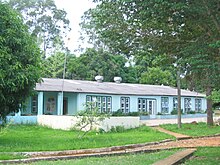Bona Espero
Fazenda-Escola Bona Espero (farm school Bona Espero, shortly Bona Espero ) is a children's village with farm- school in Alto Paraiso in Brazil , the 1957 Brazilian Esperanto founded spokesman for orphans through care, education and schooling, the chance for an independent To give life. The school runs grades 1 to 4 according to the state curricula; gifted children can go to school in the neighboring town.
history
Six Esperantists from Recife founded the association on July 25, 1957 to set up a project for orphans. Arthur Velloso, Renato Diniz, Neuza Esteves de Araújo, Elisabeth Pointcaré, Inês Nunes de Andrade and Camélia Gomes da Silva found a suitable location for their project in the central Brazilian plateau of Veadeiros (the then name of today's Alto Paraíso de Goiás). Through purchase and donation, they received an area that had meanwhile grown to 10 km², on which buildings for accommodation and school were built and where they could farm for their own use.
When the foundation funds were largely used up in the early 1970s, the association got into a financial crisis. As a solution, young people who had committed criminal offenses were admitted, for whose maintenance the Brazilian state paid. But their rehabilitation required so many forces that it threatened to lose sight of the real goal.
Since 1974 the management has been with the German-Italian couple Giuseppe and Ursula Grattapaglia. They made the project known internationally and were able to obtain permanent support in various countries.
Over the years, more than 400 children have graduated from school. Some have graduated from university. About 20 teach in neighboring villages after their teachers' exams. The teachers now working in Bona Espero both went to school in Bona Espero.
In the meantime, there are no more orphans living in Bona Espero, but social orphans and children who have been victims of physical and often sexual violence in their own families and who have been withdrawn from their families by court order.
Principles
- Trust, renunciation of violence: The upbringing should strengthen the personality of the children and give them renewed trust. Avoidance of violence shapes coexistence - the children are also encouraged to resolve conflicts among themselves without violence.
- Family, help, personal responsibility: the children live in small groups with one or two adult employees in one house, almost like a family. Most of the vegetarian meals are eaten together in the large dining room. The children help in the kitchen and washing up. You are responsible for your own clothes, which you wash yourself.
- Ecology: Ecological behavior and economical management are exemplified. As far as possible, home-grown (organic) food is used.
- Internationalism: Although learning a foreign language is not part of the curriculum, it is easy because many volunteers come from other countries and use Esperanto for internal communication.
financing
The Brazilian state pays the salaries of the two teachers as well as a certain (very low) daily rate for each interned child: in 2008 it was 250 real a month - with 25 children; that is by far not even sufficient for the daily need for food. Since the village has been connected to the electricity and telephone network, the electricity and telephone costs are also covered by the Brazilian state.
Most of the costs have to be borne by donations. It relieves the budget that the association can produce some of the food (vegetables and fruit) itself.
building
When the founders arrived, they found a house. A geographer had lived there who had to survey the Goias region. The house, in need of renovation, became a residential building, school, dining room and kitchen. Other buildings were built later; first the "pionira domo" at the Mulungu stream. In 1989 a workshop was also set up to train the children in practical skills. They also maintain tools, machines and vehicles there.
A reservoir was created, which supplies the whole village with excellent drinking water. A self-constructed hydraulic ram pumps water from the reservoir about 50 meters higher to the buildings and to supply the gardens. A second ram pump has been available since 2008. The additional water is used, among other things, to irrigate the newly planted trees.
International support
Due to the special contacts with the Esperanto movement, Bona Espero has financial support on the one hand, and constant international contacts and many visitors from different countries on the other. Larger donations were collected in Japan, Germany, France, Brazil and China, with which a new school building and the dining room could be built in 2005.
The help of volunteers (so far from Germany, France, Argentina, Uruguay, Slovakia, Russia, Poland, Italy), who come for a few months or a whole year and who take on all the work that comes up - depending on the talent more in the manual work, is indispensable or in the educational field. Although most of them speak little or no Portuguese at first, communication is not a problem: they speak Esperanto with the adults and the children learn it on the side.
literature
- Roman Dobrzyński: Bona Espero - idealo kaj realo . 2008
Web links
- Homepage of the German Friends' Association
- Report in French about a trip around the world with a stay in Bona Espero
- Photos by Bona Espero in the picture archive Austria
Coordinates: 14 ° 8 ′ 1 ″ S , 47 ° 37 ′ 5 ″ W.

